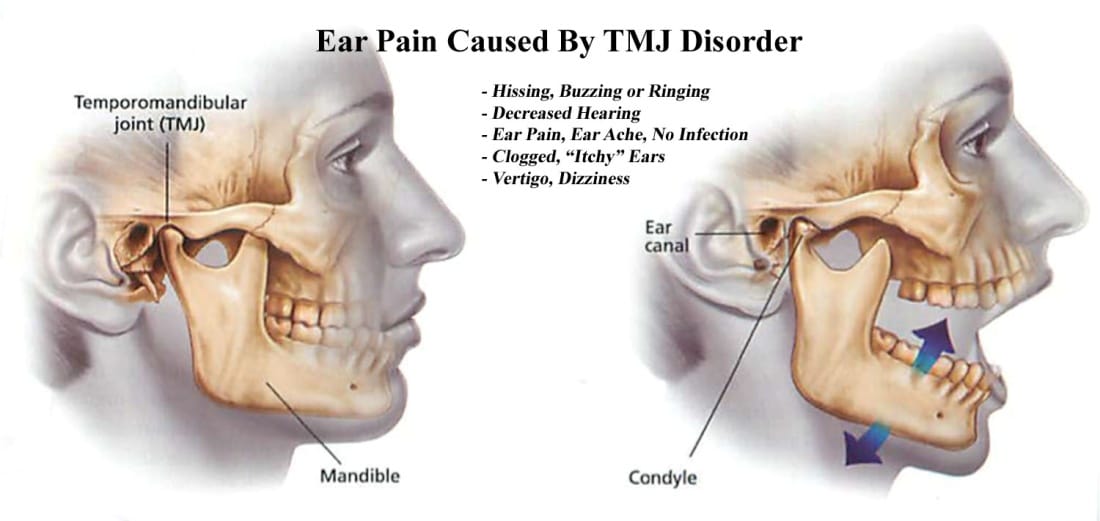Temporomandibular joint disorder (TMJ disorder) is elusive. When your jaw hurts it naturally leads you to think it’s a jaw problem. But here’s where it gets tricky: TMJ disorder can also be the source of ear pain, tinnitus, and headache. It can interrupt people’s sleep and is also linked to psychological stress and even linked to depression.
Because there’s a slew of seemingly unrelated symptoms that intertwine to form TMJ disorder, the condition is often misdiagnosed and misunderstood. Today let’s talk about the three most misdiagnosed symptoms of temporomandibular joint disorder.
Spoiler alert: It’s Headaches, Ear pain, and Tinnitus. But there’s a lot more to it than just that.
How temporomandibular joint disorder tricks us and why it matters
Patients are usually aware that jaw fatigue, clicking, popping, jaw locking, teeth clenching, and grinding are jaw-related. That makes sense. But when you’re suffering from a headache would you first think about your jaw? Probably not.
Sufferers of TMJ pain often first seek help from a variety of specialists. People see neurologists for headaches and ENTs for ear pain. They see dentists for jaw soreness, psychologists for stress, and physical therapists for back and shoulder pain. Gosh, that’s alot of doctors, but here’s the deal…there are usually links between various symptoms of the head and neck.
The scariest thing is people suffer for much longer than they should. The best results are when treatment is aligned by a TMJ specialist or a team of healthcare providers who are not working separately, but in coordination.
The symptoms that people would never assume are caused by TMJ disorder

The symptoms that people would never assume are caused by TMJ disorder are ear pain, tinnitus, and headaches. When your ear hurts, it makes sense for you to first seek an ear specialist, and when you have a headache, you’re not wrong to first think it’s your head. Sometimes that’s true, and it’s a good place to start, but often the TMJ and the surrounding muscles can create ear problems and headaches. Let’s look at each one individually to help explain how the jaw can create these seemingly unrelated symptoms.
Headaches
About 45% of the world population suffers from reoccurring headaches. Headaches are signicantly more common in cohorts that have temporomandibular disorder (TMDs). In fact, prevalence of headaches nearly double in the population that has TMJ disorder. And don’t just take my word for it, studies show that prevalence of headache in the TMJ dysfunctional population varies between 48% and 77%, which is much higher than the general population.
The same study showed headache makes TMJ pain parameters more intense and frequent. The researchers believed that early and multidisciplinary treatment of TMJ dysfunction should be performed in order to avoid the overlay of painful headache symptoms.
How on earth does my jaw cause headaches?
So now you’re wondering: how can a disorder of the jaw like TMJ disorder cause headaches. Well, its not a single way, but a collection of ways. Futhermore, its not fully understood at this time, but I’ll tell you what we know. Studies are supporting that strain from the muscles of the head and neck, the jaw, and the TMJs themselves can refer pain to the head causing a headache. In addition, muscle strain of the jaw can overwhelm the jaw muscles which begins to strain accessory muscles of the head and neck. And finally, metabolic alterations due to microcirculatory disturbances can result in pain that resembles headaches.
Ear pain
If you are having ear pain, and your physician has told you that your ears are okay, it can be incredibly frustrating. You’re thinking, if my ears are healthy, then what’s causing the pain? It sometimes can be shocking to find out that your ear pain is caused by TMJ disorder. It doesn’t seem to make sense that the joint of the jaw could make the ear hurt. Many patients wonder how that could be.
Can TMJ disorder cause damage that creates ear pain?
Well not exactly. The key concept to understand is that ear pain and TMJ pain is a matter of proximity. The TMJ is located about 0.5 cm away from the middle ear, and the ear is also highly innervated. If the TMJ is inflamed, it can easily feel like the pain is in your ear, but really the source of the pain is tension, inflammation, or fluid associated with the ear’s neighbor….the temporomandibular joint.
The studies agree that TMJ dysfunction can be associated with earaches. In a 2014 study, the researchers concluded, there was a significant association between the temporomandibular joint disorder and earache. Its interesting to note that this same study found there was no significant association between the TMJ dysfunction and what the patients consider ear fullness.
Tinnitus
Tinnitus is the medical term for what most people consider ringing in the ears. When I say ringing in the ears, I don’t mean an occasional ringing. People who suffer from tinnitus can have ringing in their ears every day, all day. If that sounds minor to you, try to imagine living with a humming bird next to your ear all day long. Eventually the sound becomes quite debilitating to a person’s focus and mood.
Tinnitus affects about 20 to 25 percent of the world population and it is considered a symptom; not a disorder. Tinnitus is a symptom of an underlying condition. It’s not considered a condition on its own.
What’s exactly happening with tinnitus from TMJ?
There are two types of tinnitus, subjective and objective. Subjective tinnitus can be caused by problems in the inner, middle, or outer ear. Most notability it can also be caused by the way the nerves of the ear are processing sound. Objective tinnitus is more of a true sound within the ear. It can be a blood vessel condition, middle ear problem, bone condition, and yes, ear ringing can be caused by inflammation from the TMJ which lies adjacent to the middle ear. Similar to ear pain from TMJ disorder, tinnitus is a matter of location. The muscle strain, nerve pain, and inflammation from TMJ dysfunction, can create tinnitus due to the ear’s close location to the strain of the TMJ area.
Can headache, ear pain, or tinnitus be something more serious like a tumor?
It’s possible but extremely rare for TMJ-like symptoms to be caused by more severe issues like a tumor or aneurysm. So that should be a sigh of relief, but you’re not out of the woods fully until you have it checked out.
Here’s my best advice: if you are having persistent symptoms for more than a week or two that are worsening, you should consult with your primary care physician or dentist. That’s usually a good place to start. They will help you to rule out if there is something more serious going on, if they can handle it in their office, or if you should seek a TMJ disorder specialist.
The Bottom Line with Headaches, Ear Pain, and Tinnitus

If you have nagging headaches, ear pain, or tinnitus…its downright fustrating. The best first place to start is by having the most common source examined. If your head hurts, it makes sense first for your primary care physician to examine your head and cardiovascular system. If you’re having ear problems your physician or ENT should rule out a true ear condition.
What I want you to keep in mind is…if you’re struggling with these conditions and have had them treated with no relief, you should consider that the pain is potentially being referred from somewhere else. Headaches, ear pain, and tinnitus are the three most common symptoms of TMJ disorder that surprise patients to find out are TMJ related. Don’t let the origin of these tricky symptoms fool you if you are suffering.


